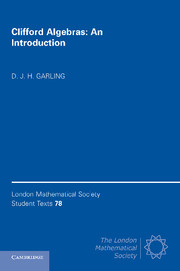2 - Algebras, representations and modules
Published online by Cambridge University Press: 05 June 2012
Summary
Clifford algebras are finite-dimensional algebras. Here we consider the properties of finite-dimensional algebras. We also consider how they can be represented as algebras of endomorphisms of a vector space, or equivalently as algebras of matrices. An alternative way of thinking about this is to consider modules over an algebra; this is important in the theory of Clifford algebras, where such modules appear as spaces of spinors.
Algebras
Again, let K denote either the field R of real numbers or the field C of complex numbers. A finite-dimensional (associative) algebra A over K is a finite-dimensional vector space over K equipped with a law of composition: that is, a mapping (multiplication) (a, b) → ab from A × A into A which satisfies
(ab)c = a(bc) (associativity),
a(b + c) = ab + ac,
(a + b)c = ac + bc,
λ(ab) = (λa)b = a(λb),
for λ ∈ K and a, b, c ∈ A. (As usual, multiplication is carried out before addition).
An algebra A is unital if there exists 1 ∈ A, the identity element, such that 1a = a1 = a for all a ∈ A. We shall principally be concerned with unital algebras. An algebra A is commutative if ab = ba for all a, b ∈ A.
A mapping φ from an algebra A over K to an algebra B over K is an algebra homomorphism if it is linear, and if φ(ab) = φ(a)φ(b) for a, b ∈ A.
- Type
- Chapter
- Information
- Clifford Algebras: An Introduction , pp. 16 - 35Publisher: Cambridge University PressPrint publication year: 2011



